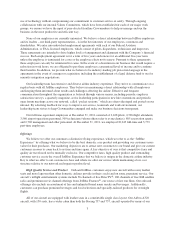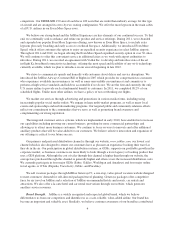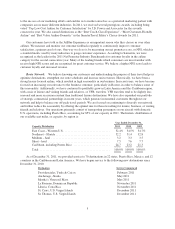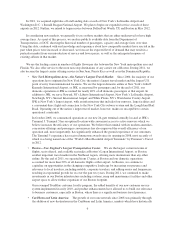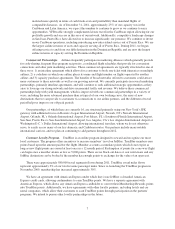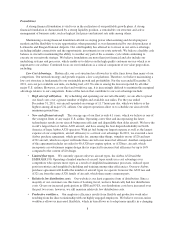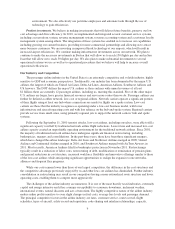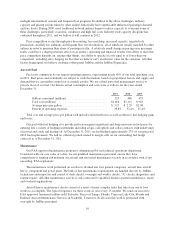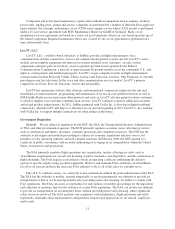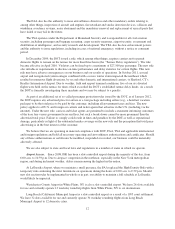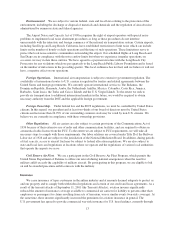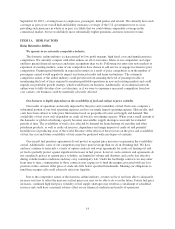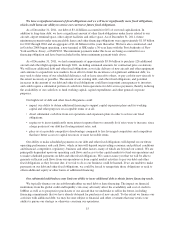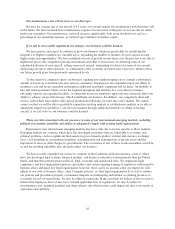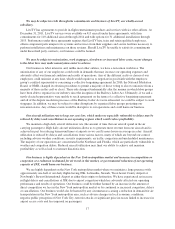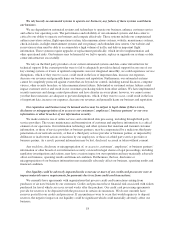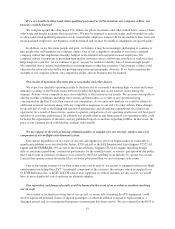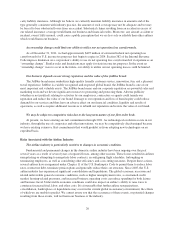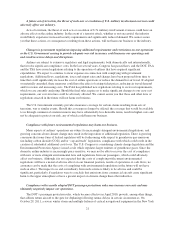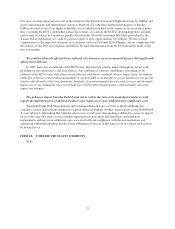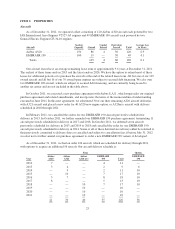JetBlue Airlines 2011 Annual Report Download - page 23
Download and view the complete annual report
Please find page 23 of the 2011 JetBlue Airlines annual report below. You can navigate through the pages in the report by either clicking on the pages listed below, or by using the keyword search tool below to find specific information within the annual report.Environmental. We are subject to various federal, state and local laws relating to the protection of the
environment, including the discharge or disposal of materials and chemicals and the regulation of aircraft noise
administered by numerous state and federal agencies.
The Airport Noise and Capacity Act of 1990 recognizes the right of airport operators with special noise
problems to implement local noise abatement procedures as long as those procedures do not interfere
unreasonably with the interstate and foreign commerce of the national air transportation system. Certain airports,
including San Diego and Long Beach, California, have established restrictions to limit noise which can include
limits on the number of hourly or daily operations and the time of such operations. These limitations serve to
protect the local noise-sensitive communities surrounding the airport. Our scheduled flights at Long Beach and
San Diego are in compliance with the noise curfew limits but when we experience irregular operations, on
occasion, we may violate these curfews. We have agreed to a payment structure with the Long Beach City
Prosecutor for any violations which we pay quarterly to the Long Beach Public Library Foundation and is based
on the number of infractions in the preceding quarter. This local ordinance has not had, and we believe it will not
have, a negative effect on our operations.
Foreign Operations.International air transportation is subject to extensive government regulation. The
availability of international routes to U.S. carriers is regulated by treaties and related agreements between the
United States and foreign governments. We currently operate international service to The Bahamas, the
Dominican Republic, Bermuda, Aruba, the Netherlands Antilles, Mexico, Colombia, Costa Rica, Jamaica,
Barbados, Saint Lucia, the Turks and Caicos Islands and the U.S. Virgin Islands. To the extent we seek to
provide air transportation to additional international markets in the future, we would be required to obtain
necessary authority from the DOT and the applicable foreign government.
Foreign Ownership. Under federal law and the DOT regulations, we must be controlled by United States
citizens. In this regard, our president and at least two-thirds of our board of directors must be United States
citizens and not more than 24.99% of our outstanding common stock may be voted by non-U.S. citizens. We
believe we are currently in compliance with these ownership provisions.
Other Regulations. All air carriers are also subject to certain provisions of the Communications Act of
1934 because of their extensive use of radio and other communication facilities, and are required to obtain an
aeronautical radio license from the FCC. To the extent we are subject to FCC requirements, we will take all
necessary steps to comply with those requirements. Our labor relations are covered under Title II of the Railway
Labor Act of 1926 and are subject to the jurisdiction of the National Mediation Board. In addition, during periods
of fuel scarcity, access to aircraft fuel may be subject to federal allocation regulations. We are also subject to
state and local laws and regulations at locations where we operate and the regulations of various local authorities
that operate the airports we serve.
Civil Reserve Air Fleet. We are a participant in the Civil Reserve Air Fleet Program, which permits the
United States Department of Defense to utilize our aircraft during national emergencies when the need for
military airlift exceeds the capability of military aircraft. By participating in this program, we are eligible to bid
on and be awarded peacetime airlift contracts with the military.
Insurance
We carry insurance of types customary in the airline industry and at amounts deemed adequate to protect us
and our property and to comply both with federal regulations and certain of our credit and lease agreements. As a
result of the terrorist attacks of September 11, 2001 (the Terrorist Attacks), aviation insurers significantly
reduced the amount of insurance coverage available to commercial air carriers for liability to persons other than
employees or passengers for claims resulting from acts of terrorism, war or similar events (war-risk coverage). At
the same time, these insurers significantly increased the premiums for aviation insurance in general. The
U.S. government has agreed to provide commercial war-risk insurance for U.S. based airlines, currently through
13


